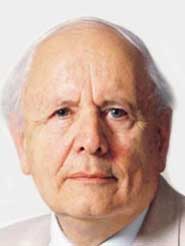Gordon Stone, who sadly passed away in Texas after a short illness on Wednesday 6 April 2011, was appointed to the newly established Chair of Inorganic Chemistry in the University in 1963, a position he held until his mandatory retirement in 1990. Being still at the height of his powers, he then moved to Baylor University in Texas as the Robert A Welch Distinguished Professor of Chemistry and continued to make major research contributions for the next 20 years.
Gordon was recognised worldwide as a giant of inorganic chemistry and for over 50 years played a leading role in the development of the sub-discipline of organometallic chemistry, which straddles the border with organic chemistry. In his time at Bristol, he built the then Department of Inorganic Chemistry into a world-leading centre which attracted researchers from far and wide. They came to experience the vibrant atmosphere that was created by this truly inspirational man, whose infectious enthusiasm and energy, and his unfailing care for the interests of his co-workers commanded respect, loyalty and affection. He was driven, demanding, impatient and often irascible, but good humoured and great company. His influence on several generations of organometallic chemists has been immense.
He was born in Exeter in 1925, earning his BA and PhD degrees from Cambridge University in 1948 and 1952, respectively. He then spent two years at the University of Southern California before joining the department of chemistry at Harvard University as an instructor, becoming an assistant professor in 1957. After five years of striking discoveries in his independent research he returned to England and to the chair in Bristol.
He co-authored over 750 primary journal articles with some 200 graduate students and postdoctoral assistants. He co-edited with R West some 50 volumes of Advances in Organometallic Chemistry, and with E W Abel and G Wilkinson edited the volumes of Comprehensive Organometallic Chemistry I and II. He was elected a Fellow of the Royal Society in 1976, served as its Vice-President, and was a recipient of the Society’s Davy Medal in 1989 and the Royal Society of Chemistry’s Longstaff Medal in 1990. Other awards among many included the American Chemical Society’s award in Inorganic Chemistry (1985 and rarely given to non-US citizens), the Royal Society of Chemistry’s Sir Edward Frankland Prize Lectureship (1988), and the Chugaev Medal of the Kurnakov Institute (Russian Academy of Sciences) (1978). He was appointed CBE in 1990 and received honorary doctorates from six universities in three countries.
His autobiography, Leaving No Stone Unturned, was published in 1993 by the American Chemical Society as part of the series Profiles, Pathways, and Dreams. A fascinating interview with him, and an appreciation of his contributions to chemistry, was published in Inorganica Chimica Acta in 2005 (volume 358, pages 1345-1357). Notable in these publications is his pride in mentoring so many co-workers (‘my most important contribution’), his belief in the virtue of hard work, and his scathing criticisms of the developing research funding environment in the UK, with its increased emphasis on perceived economic benefit. He was always a strong proponent of unfettered, curiosity-driven basic scientific research. His stature was such that in 1998 he was commissioned by the University Grants Committee (a forerunner of the Higher Education Funding Council for England) to review the state of chemistry in UK universities; the main recommendation of the Stone Report, that there should be no more than 20 well-funded world-class chemistry departments, was not universally welcomed, or indeed implemented, but subsequent pressures have effectively moved the discipline beyond this position. That Bristol’s School of Chemistry is currently ranked in the very top tier of those departments owes much to Gordon’s involvement in its leadership over 27 years.
Gordon’s research was based on the synthesis of exciting new molecules and on new synthetic strategies, underpinned by a shrewd intuition, nicely summed up by the Nobel Prize-winning theoretical chemist Roald Hoffmann, who said of Gordon: ‘What has always impressed me is how you could know ahead of time what the theoreticians would later come up with!’.
He died three years to the day after Judith, his wife of 52 years; his three sons, James, Peter and Derek, and seven grandchildren survive him.
Selby Knox
